Description
The study of Chinese Herbal Medicine and Formulas is often a complex and arduous exercise in memorisation. Little attention is typically paid to the classical context in which these formulas developed and therefore little appreciation is given to how many formulas are related to each other (formula families) with fine, subtle adjustments.
This 3 day recording of Professor Huang Huang’s 2014 seminar will cover the most commonly prescribed families of formulas. Prof. Huang will seek to convey the classical understanding of some of these common formulas and how best to apply them in the clinical setting with respect to: a patients presentation, constitution and the progression of the disease.
This course will cover the use of the most commonly prescribed formulas from the Gui Zhi, Chai Hu and Ban Xia formula families. You will receive a complete description of how and when to prescribe these formulas according to an individual’s presentation, constitution and disease tendencies.
This is an excellent in-depth seminar on Dr. Huang’s methodology and how he works clinically with classical formulas.
The distinctive qualities of the Classical Formulas are:
1. They have been used for a long time, thus we have accumulated a lot of experience concerning their usage. Most of the classic formulas have been developed from single medicinals. From these single medicinals have developed various formulas, which bring out different characteristics the herbs. Understanding, development and usage of these formulas has come through the slow process of thousands of years of clinical trial and application, along with our predecessors’ practical experience. It has not been from one single person, or even one era, but from the painstaking effort of countless scholars and doctors over time that has solidified our understanding of this body of knowledge.
As an example there is Cinnamon Twig Decoction (guì zhï täng), just who actually created this prescription no one really knows. Certainly it was not one of the formulas that Zhang Zhong-Jing himself developed, but instead came from this collecting and arranging of various texts that contained the experiential prescriptions of doctors that had come before him.
2. They are important prescriptions for treating illness. Many of these formulas contain rather fierce, strong acting medicinals, which have a notable effect on the body. It is said “medicinals with an effect that people notice are required in the treatment of disease.” Light acting herbs like ma huang (Ephedrae Herba) or gui zhi (Cinnamomi Ramulus), strong acting ones like da huang (Rhei Radix et Rhizoma) and zhi fu zi (Aconiti Radix lateralis preparata), those with toxins such as wu tou (Aconiti Radix preparata) or ba dou (bä dòu) and those which result in severe reactions like yuan hua (Genkwa Flos) and da ji (Knoxiae Radix/Euphorbiae pekinensis Radix) are examples of such herbs. One of the distinctive characteristics of the classic formulas is the usage of these strong acting medicinals. They are different from the pairing of herbs used by later generations. Many of which are tonics herbs such as shu di huang (Rehmanniae Radix preparata), ren shen (Ginseng Radix), shi hu (Dendrobii Herba); or flowers like ju hua (Chrysanthemi Flos), mei gui hua (Rosae rugosae Flos), huo po hua (Magnoliae officinalis Flos); or food grade herbs like si gua luo (Luffae Fructus Retinervus), he ye (Nelumbinis Folium), bai bian dou (Lablab Semen album), huang dou (Soybean), or medicinal foods such as beef, deer sinew, sheep kidney or pig liver.
3. There is a strict regimen to the combining of herbs in the classic formulas. Change one herb and the name of a formula also changes, even changing the amount of one herb used will result in a formula with a new name. The formula function and illnesses treated also shift along with these changes in herbs or amounts. This is an expression of the tight relationship between how a formula is constituted and its effect; it shows the classic simplicity and beauty of structure and function.
4. The effects of using classic formulas to treat illness are relatively clear, concrete and observable. The formulas recorded in the Shang Han Lun and Jin Gui Yao Lue, although they appear to be relatively simple, they all originate from clinical experience and as such are both practical and objective. So long as an experienced clinician explains the formulas and how they are used, the code for what they treat and scope of use can be cracked. Therefore, it is of benefit to pass along this kind of concrete understanding.
Later generations of doctors used formulas that treat illness from the conceptual point of view of “yin or yang deficiency,” “fluid loss, “blazing fire,” “excess above with deficiency below,” “various wind disturbances,” and “five taxations and seven injuries”, the parameters for their usage are rather vague in comparison to the clear cut presentations treated by the classic formulas.
5. Lastly, the classic formulas use a small amount of inexpensive and commonly found herbs. They are suitable for everyone and of benefit in that they reduce medical costs for the country.
Classical Formulas to be discussed include:
- Gui Zhi Tang
- Gui Zhi Jia Long Gu Mu Li Tang
- Xiao Jian Zhong Tang
- Gui Zhi Fu Ling Wan
- Wen Jing Tang
- Dang Gui Shao Yao San
- Da Chai Hu Tang
- Xiao Chai Hu Tang
- Chai Hu Jia Long Gu Mu Li Tang
- Si Ni San
- Ban Xia Hou Po Tang
- Wen Dan Tang
- Ban Xia Xie Xin Tang
“Treating serious illness does not necessarily require the use of large prescriptions. However, the reality is that in clinic many patient’s conditions are complicated, single use of one or two classic formulas cannot take into account the entire situation. What to do? In my experience, make use of combining formulas together. What I mean by combining formulas is to take several classic formulas and use them together as a way to expand the scope of that is treated. Patients with chronic and complicated conditions can be treated in this way”
– Prof Huang Huang.
Here’s What You Get When You Register Today
5 years online access to 17 hrs 5 minutes detailed clinical applications for
Gui Zhi, Chai Hu and Ban Xia classical formulas (in Chinese with English translation)
Unlimited reviews within that time
PDF download of the same notes (both Chinese & English) used in the presentation
A certificate worth 17 CPD points upon the successful completion of a final quiz
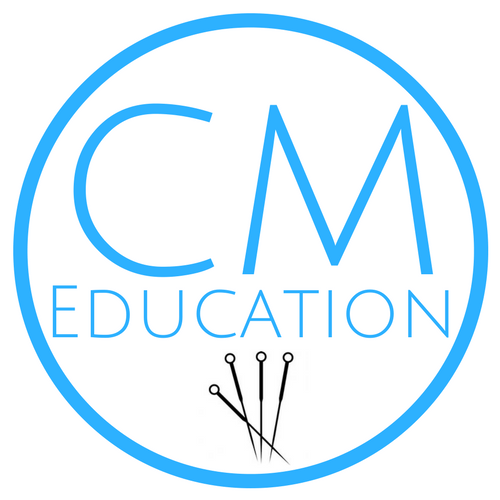
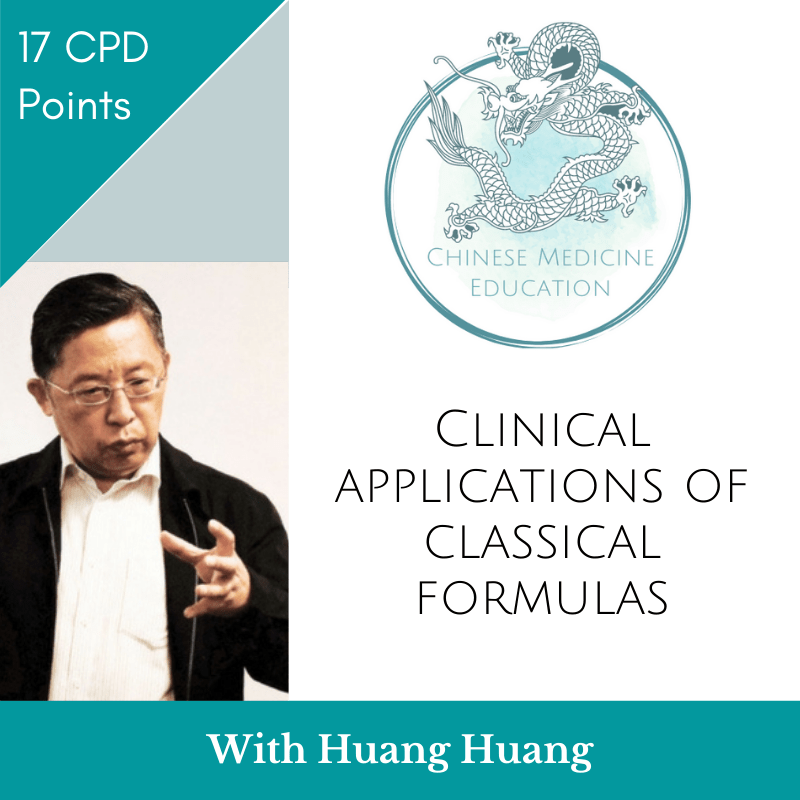
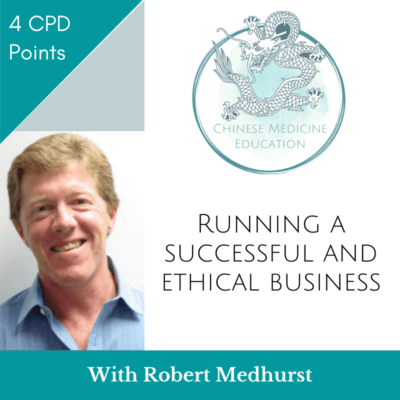
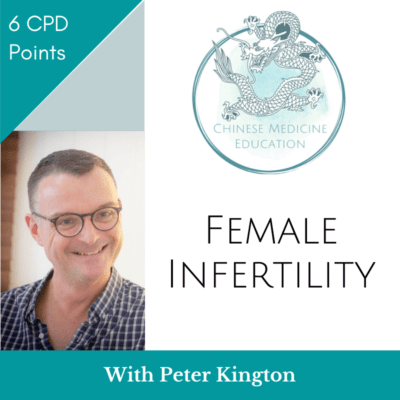
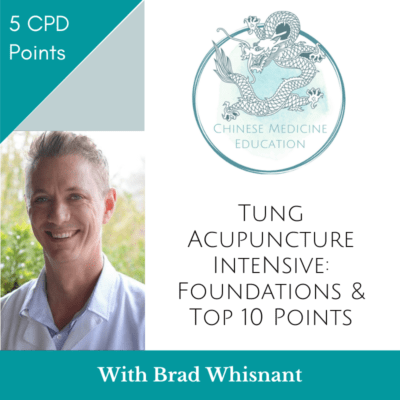
Reviews
There are no reviews yet.